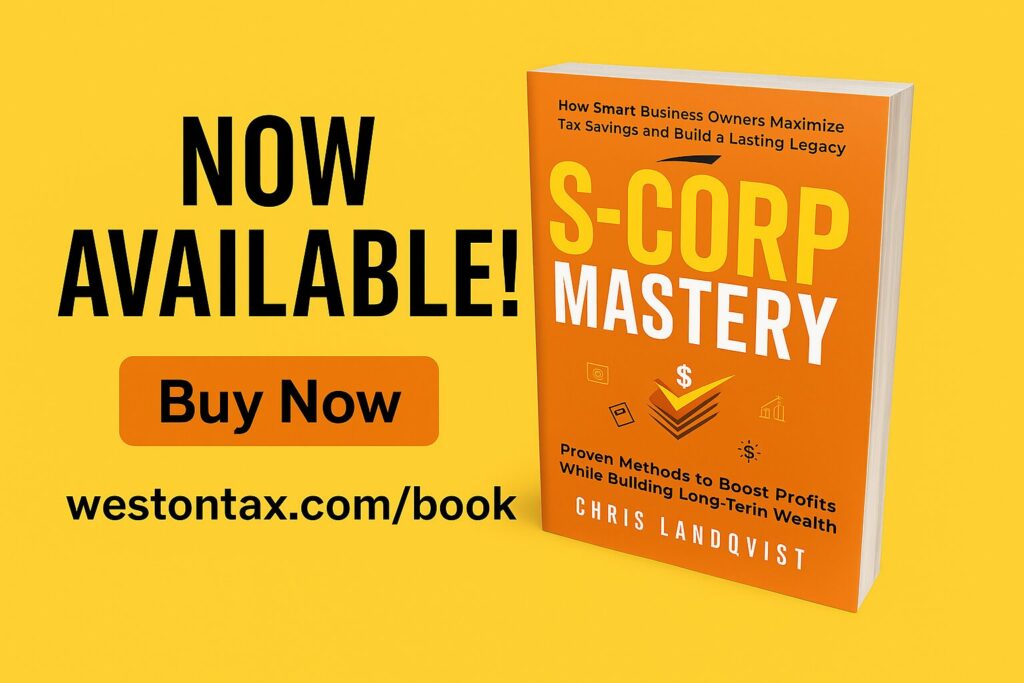As we approach the end of the year… my phone starts buzzing with the same question:
“Chris, can you help me lower my tax bill before I file?”
I wish I could say “YES” every time. But here’s the truth that most business owners never hear from their accountant. By the time you’re filing, it’s already too late. The truth is that most people are working with a compliance expert… not a strategic planner like myself.
The real tax deadline isn’t April 15… it’s December 31!
That’s when the IRS locks in your score. After that, you’re no longer playing the game. You’re just reporting the results.
So, if you wait until now to do something about your situation? You’re not planning. In fact, you’re explaining what already happened.
Does that mean it’s too late for me?
Not entirely — but it does make things harder.
Once the year closes, your options shrink. There’s less flexibility, more paperwork, and often higher costs to correct what could’ve been prevented with a little foresight. You lose the luxury of time… and that’s the one thing great tax planning depends on.
But here’s the good news: even when things get tight, I can still help you make strategic moves that count. The key is acting now… while the window’s still open.
The Real Finish Line Is December 31
Think of April 15 as the post-game interview. The real action happens in December.
Every meaningful tax move , whether adjusting your S-Corp salary, buying new equipment, setting up a retirement plan, or making charitable contributions — depends on what you do before the year ends.
And yet, every year, millions of business owners cross into January without realizing the window just closed. Not because they don’t care. But because nobody ever told them that tax strategy is a December sport, not an April chore.
Why So Many Business Owners Miss It
Most accountants are historians. They tell you what happened last year. But real tax strategy is about shaping what happens next.
By the time April rolls around, the best you can do is file and pay. The magic (the planning, timing, and positioning) happens now. To be fair, it’s also some of the most impactful time you can spend inside your business.
That’s why Q4 is when we go into strategy overdrive. Because when you act before December 31, the IRS code starts working for you, not against you.
A Real Story: How One Business Owner Beat the Clock
Let me tell you about “Mike,” a trucking business owner in Texas.
In late November, Mike called me with a problem: he’d had a record year. Higher sales with great margins… all good stuff. A magical story if you will. But, he hadn’t adjusted his strategy. His accountant told him to expect a painful tax bill.
After he started working with me, I started running projections some end of the year projections. It quickly became evident that he could purchase ~$1,500,000 in new equipment that he was already planning to buy next year.
By purchasing and placing it into service before December 31, he was able to write off the whole purchase against his current income. What made this even better… he financed 90% of the purchase at a low interest rate.
That single move reduced his taxable income saving him over $500,000 in taxes. Complete power move.
We also had him pay a few January invoices in advance and max out his 401(k) contributions before year-end. With just two conversations and some intentional timing, we turned a stressful December into a strategic one.
That’s what “planning” really looks like. It’s not creative accounting, it’s calculated timing.
How Timing Creates Tax Leverage
Here’s the part most people miss: tax deductions aren’t just about what you buy — they’re about when you buy it and how you structure it.
If you purchase an asset (like real estate, machinery, or a vehicle) and place it in service before December 31, you can typically deduct depreciation this year, not next. The “placed in service” rule is one of the IRS’s favorite tests.
So if you’ve been eyeing a new forklift, building renovations, or that next piece of manufacturing equipment… now might be the time to act. Waiting until January means you’ll wait another full year to take the deduction.
In short, the earlier you move, the more options you keep.
What About Retirement Accounts?
Not everything closes on December 31. And that’s where strategy gets fun.
Take retirement accounts, for example. If you open an IRA by December 31, you can still fund it as late as April 15 of the following year and get the deduction for this year.
One of my clients, Anna (a creative agency owner), set up her IRA on December 20th. I quickly calculated her maximum allowable contribution, and she funded it the following March. It’s one of the few places the IRS lets you bend time — but only if the plan exists by year-end.
Other Hidden Opportunities Before Year-End
The list doesn’t stop there. A few often-overlooked moves still available before December 31 include:
- Prepaying deductible expenses. Rent, insurance, or professional fees can often be prepaid for a full-year deduction.
- Funding a Health Reimbursement Arrangement (like a QSEHRA). Set it up now and start reimbursing tax-free.
- Making charitable contributions of appreciated assets. Donating stock instead of cash can create a double benefit — a deduction plus avoided capital gains.
- Reviewing owner compensation. Adjusting W-2 wages for S-Corp owners can optimize both tax efficiency and retirement contributions.
Each of these tactics relies on timing and documentation. That’s why planning now, not in spring, is what separates those who pay more tax from those who pay smarter.
The Deadline You Can’t Afford to Miss
Here’s the bottom line: every December, business owners unknowingly donate money to the IRS simply because they didn’t move fast enough. The tax code rewards action, not good intentions.
If you’re running a business, December 31 isn’t just another date on the calendar. It’s your true year-end finish line.
If you’re late to the party… no worries. Just schedule a consultation and I’ll see if it’s worth taking a deep dive into your structure, income, and opportunities to legally reduce taxes before the clock runs out. You can set up the initial evaluation call HERE.
Because tax planning isn’t something you do once a year. It’s how smart business owners build wealth. One strategic move at a time.
Welcome to the New Age of Accounting. Let’s begin.
P.S. If you found this article helpful, you’ll love my new book S-Corp Mastery: How Smart Business Owners Maximize Tax Savings & Build a Lasting Legacy. It’s now live and available in a sleek, easy-to-read PDF version. Grab your copy here

Chris is the Managing Partner at Weston Tax Associates, a best-selling author, and a renowned tax strategist. With over 20 years of expertise in tax and corporate finance, he simplifies complex tax concepts into actionable strategies that drive business growth. Originally from Sweden, he now lives in Florida with his wife and two sons.










